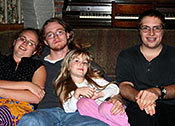 |
We will hear from economic experts about the causes and realities of the changing conditions facing the middle class, and we will hear the stories of real families, and present snap-shots of the growing challenges that many of them face. Our journey will take us from Massachusetts, where the promise of hi-tech and a knowledge-based economy is leaving millions of Baystaters behind. We will visit rural Vermont, where despite the beauty of the state’s green rolling hills, thousands of working families are struggling to heat their homes and make ends meet. And as we advance the series into its second stage, we will hear stories of economic change and challenge from Michigan, home to the nation’s declining auto industry, where families that once counted on high-paying unionized jobs, are now struggling to stay afloat – or leaving the state altogether. And finally, we will look for solutions, and ask what policies can government and local communities promote restore the stability and security of middle class America.

The Husher Children:
(seated l-r) Chelsea, Nick, Naomi and Loren. |
|
For the first time in American history there is a troubling and almost contradictory set of economic forces that are challenging the very fabric of American society. On the one hand, during the last decade and a half, American productivity surged. At the beginning of 2006, just before the onset of the current economic slow-down, the American economy was growing at a robust 5.3 percent – a strong measure of a society on the move. And yet, for the first time in American history, that robust economic performance didn’t reach the middle class. In terms of wages, "the middle class is nowhere it was in 2000," according to Jarred Bernstein, an economist with the Economic Policy Institute in Washington, D.C. Bernstein says more and more working Americans are asking the question, "If the economy is doing so well, why do I feel so squeezed?"
High prices for fuel, food, housing and health care have only increased the pressure on the middle class. Savings are at an all time low; consumer debt is at all-time high. Middle class families are struggling to pay for home, health insurance, transportation and their children’s college. The dream of the American middle class – that hard work and playing by the rules are the keys to success and upward mobility – is being transformed by a deepening sense of insecurity. It’s becoming harder for families to afford what we consider a typical middle-class lifestyle, according to Christian Weller of the Center for American Progress, a political think tank headed by John Podesta a former Chief of Staff to President Clinton. Weller told the Boston Globe, "For most working Americans, things are far worse than at any time – certainly in recent history."
At the same time, a widening income gap between the richest Americans and everybody else is challenging the basic progressive notions of American society. The wealthiest one percent of Americans now earn 22 percent – nearly a quarter – of the nation’s income. According to experts who track economic data, the disparity has risen to its highest level since the Great Depression. This represents a dramatic turn-around since the years of the post war middle class boom, when most of the growth in wages benefited low and middle income Americans. Now, while average wages continue to grow, most of the growth benefits the richest ten percent of Americans. So the notion of the great American dream, embodied so powerfully by post-war middle class progress, is being threatened.
Consider that during the great middle class expansion of the 1950s the cost of the three fundamentals of energy, food and health care were going down. At that same time, the cost of credit was regulated by statute. A factory job paid a living wage and provided pensions to millions of workers who could raise a family, put their children through college, and look forward to a secure retirement, maybe even enjoying a modest vacation home. Today, the pensions and savings are gone; the cost of energy, food and health care is soaring; widespread economic security is replaced by economic fear and rising debt. For the vast majority of working Americans, wages are flat. For the first time, working families are facing the prospect of doing worse than their parents' generation.
If you have any questions or comments please contact us at middleclass@wbur.org.
|
 |

